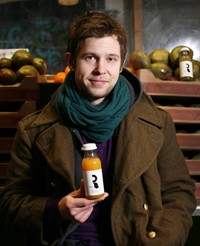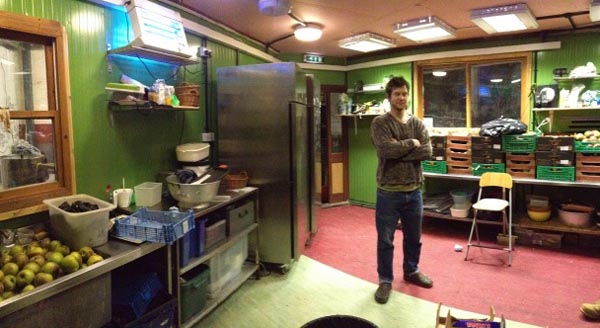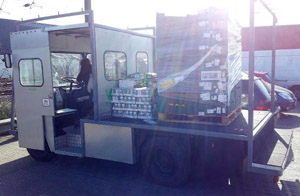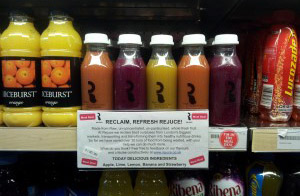 Case study of Rejuce, which is a London-based smoothie and juice company that transforms surplus fruit and vegetables from London's wholesale markets into smoothies and juices, which are then sold to customers around London.
Case study of Rejuce, which is a London-based smoothie and juice company that transforms surplus fruit and vegetables from London's wholesale markets into smoothies and juices, which are then sold to customers around London.
 Rejuce: background and core values
Rejuce: background and core values
The company was founded by chef Thomas Fletcher (right), who built the business by reusing, redirecting and recycling food surpluses from local markets and supermarkets by bicycle: transporting and transforming it into healthy, eco-friendly juices, soups and smoothies.
Thomas defines food waste as food that is “not good enough to be sold, but too good to be thrown away". This description includes fruit and vegetables that are a little bruised, too ripe, under-ripe, or it may be that they just don’t meet the expected aesthetic standard of the consumer or that the trader has bought more than they can sell or have space for.
Rejuce’s bold mission is “to dry up edible food surpluses, in London’s biggest markets and distribution centres, providing affordable, healthy products to localist shops, cafes, bars, pubs, clubs and restaurants".
How Rejuce minimises waste
Each year over 400,000 tonnes of fresh, nutritious fruit and vegetables are wasted by the retail industry - cast aside and left to rot in expensive landfill sites. That’s the equivalent of 2.7 billion juicy Granny Smith apples. The team at Rejuce are doing their bit to change this.

First thing every morning, the Rejuce team sets out to London’s biggest food markets and rescues the finest specimens of unsold fruit. Then they cart it back to their kitchen in Hackney Wick’s Fish Island and juice it, cook it and then bottle the drinks in 100% compostable bottles. So far, the people at Rejuce have saved over 60 tonnes of food, making them not just “Karma Neutral” but “Carbon Negative”.
The company not only makes delicious juices and smoothies from food that would have otherwise been wasted (never using concentrates or artificial additives - just whole fruit and veg), it also has plans to build an anaerobic digester for the company to move even more waste up the food waste hierarchy. This will allow it to convert cardboard and food that they cannot use into liquid plant food, solid fertiliser and biogas. The energy produced could also be used by a generator to power the batteries on the company milk float (see picture below), which is used to transport the fruit and vegetables. Thomas has even experimented in drying the pulp leftover from the juicing process and turning it into paper (both artistic and toilet paper) to close the recycling loop.


Due to the way the ingredients are sourced, Rejuce is able to keep product prices low. At £1.50 for 250ml of juice, Thomas has been asked by traders and festival organisers to increase his prices, but he always refuses. The company’s drive to keep waste to an absolute minimum means that, contrary to the commonly held belief that traders should never sell out, Rejuce actively plans to stock less than it could sell. This business model ensures that they will not be left with excess produce that might otherwise be wasted.
Contact for Rejuce, email: tjf@rejuce.co.uk. Twitter: @rejuce_
This case study has been prepared by Sustain: The alliance for better food and farming, as part of the FoodSave project, helping small- and medium-sized enterprises to reduce food waste. If you run a small food business in London and want help reducing your food waste, please get in touch. Email: charlotte@sustainweb.org; tel: 0203 5596 777; web: www.sustainweb.org/foodsave/

FoodSave is funded by the European Regional Development Fund (ERDF), the London Waste and Recycling Board (LWARB) and the Mayor of London, co-ordinated by the Greater London Authority (GLA) and supported by the London Food Board.
Food Waste: Sustain supports a reduction in food surplus, loss and waste.
